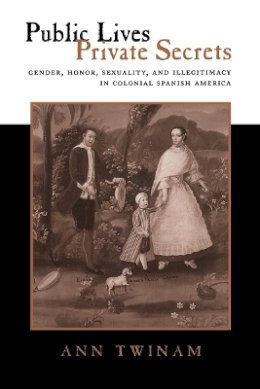
Public Lives, Private Secrets: Gender, Honor, Sexuality, and Illegitimacy in Colonial Spanish America
Ann Twinam
Throughout the eighteenth and early nineteenth centuries, illegitimate offspring of elite families in colonial Spanish America appealed to the Council and Cámara of the Indies in Spain to purchase gracias al sacar legitimations. Their applications provided intimate testimony concerning their own lives, accounts of their parents' sexual relationships, and details regarding the impact of illegitimacy within their families and communities. Bourbon officials in Spain debated which petitions merited approval, and in the process forged policies concerning gender, sexuality, illegitimacy, and the family.
Scattered throughout the Archive of the Indies, the petitions were difficult to locate until the author determined the ... Read more
The collective biographies of the gracias al sacar parents, and of their illegitimate offspring—as infants, children, and adults—reveal a Hispanic mentality that consciously differentiated between the public and private spheres. Colonial elites distinguished between a private circle of family, kin, and intimate friends and a public world where status (honor) was negotiated with outside peers. This bifurcation was distinct yet permeable; an individual might "pass" to negotiate a public status different from a private reality. Thus, an unwed mother might enjoy the public reputation that she was a virgin, the bastard son of a priest might be treated as legitimate, and a mulatto could be transformed into someone white.
The author explores how the probability for passing varied throughout the Spanish Empire, and how it narrowed as the eighteenth century drew to a close. She also demonstrates that the inability to conceptualize passing beyond the scope of the individual exacerbated social tensions prior to independence.
Show LessProduct Details
About Ann Twinam
Reviews for Public Lives, Private Secrets: Gender, Honor, Sexuality, and Illegitimacy in Colonial Spanish America
